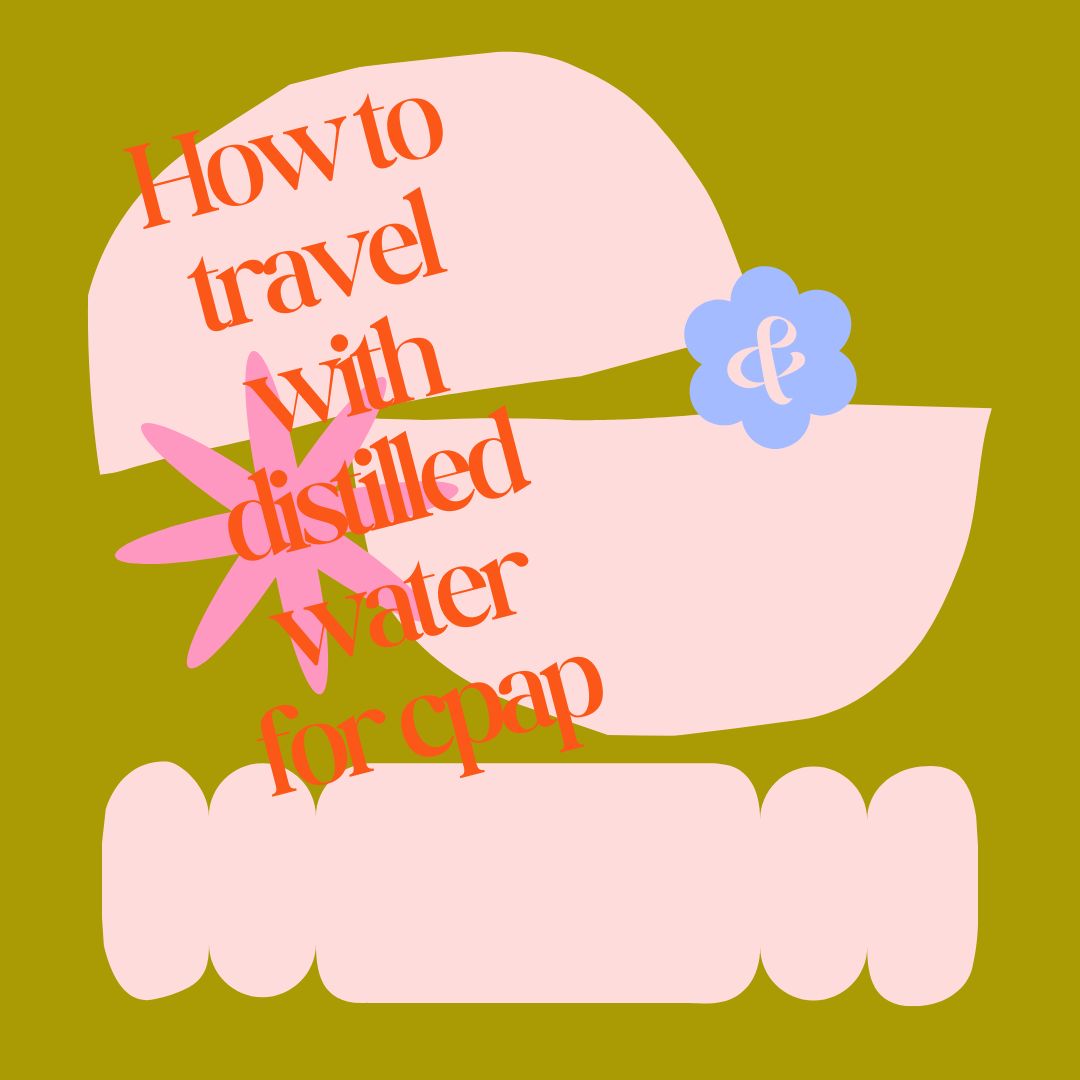How to travel with distilled water for cpap
Introduction about How to travel with distilled water for cpap

How to travel with distilled water for cpap : Nevertheless, even if you confirm that refined water is compatible with your CPAP machine, it may be undergoing this extensive treatment. If you use a CPAP and need to keep up your health and quality of sleep while you are away from home, use refined water as directed. This comprehensive guide will examine a variety of strategies, concepts, and components to assist you in determining the difficulties of using refined water for your CPAP machine.
Understanding the Importance of Distilled Water for CPAP
Why Distilled Water is Essential
Refined water assumes a pivotal part in the legitimate working and support of your CPAP machine. Here’s the reason it’s so significant: How to travel with distilled water for cpap
- Purity: Minerals, bacteria, and other impurities that can be found in tap water or even filtered water are not present in distilled water. This immaculateness forestalls the development of mineral stores in your CPAP machine and its parts. Machine Longevity: By preventing mineral scale buildup, which can damage internal components, using distilled water can significantly extend the life of your CPAP machine. Cleanliness: The shortfall of pollutions in refined water lessens the gamble of bacterial development in your CPAP humidifier chamber, tubing, and veil, advancing better in general cleanliness. Ideal Humidification: Refined water considers more productive and cleaner humidification, which is fundamental for forestalling dryness and bothering in your aviation routes during treatment.
Risks of Using Non-Distilled Water
When traveling, it may be tempting to use bottled or tap water, but doing so can have a number of negative effects: How to travel with distilled water for cpap
- Mineral Buildup: Using non-distilled water can leave mineral deposits in your CPAP machine, which could clog the filters and tubes and make your therapy less effective. Bacterial Development: Regular water might contain microorganisms that can duplicate in the warm, damp climate of your CPAP machine, possibly prompting respiratory contaminations. Diminished Machine Execution: Over the long run, mineral stores can influence the presentation of your CPAP machine, possibly prompting expensive fixes or substitution. Warranty Void: Using non-distilled water can void your CPAP’s warranty, as many manufacturers stipulate.
Since you are aware of these dangers, it is critical to figure out how to travel with distilled water for CPAP therapy so that you can receive consistent and safe treatment wherever you go.
Planning Ahead: Pre-Travel Considerations
Estimating Your Distilled Water Needs

Prior to leaving on your excursion, it’s pivotal to compute how much refined water you’ll require for your outing. Take into consideration the following: How to travel with distilled water for cpap
- Duration of Stay: Multiply the number of nights you will be away from home by your typical daily water consumption. Climate: Dry or high-altitude areas may need more humidification, which will make you need more water. Individual Inclinations: Assuming you favor higher moistness settings, figure extra water utilization.
Estimate your distilled water requirements using the following table as a general guide: How to travel with distilled water for cpap
| Trip Duration | Average Nightly Usage | Total Water Needed |
|---|---|---|
| 3 nights | 300 ml | 900 ml |
| 5 nights | 300 ml | 1500 ml |
| 7 nights | 300 ml | 2100 ml |
| 10 nights | 300 ml | 3000 ml |
Keep in mind to adjust these estimates according to your individual usage and travel circumstances.
Researching Your Destination
Thorough research about your destination can greatly ease the process of traveling with distilled water. Consider the following: How to travel with distilled water for cpap
- Local Availability: Research whether refined water is promptly accessible at your objective. Actually look at nearby drug stores, grocery stores, or clinical inventory stores.
- Water Quality: Investigate the water quality in the area if distilled water is unavailable. After proper filtration, there may be water in some locations that is safe for CPAP use.
- Accommodation Facilities: If you’re staying in a hotel, find out if they can provide distilled water or whether they have facilities for boiling and cooling water.
- Local CPAP Suppliers: In the event that you require supplies or assistance, make a list of local CPAP suppliers or medical equipment stores at your destination.
Contacting Your Airline
On the off chance that you’re going via air, it’s fundamental to comprehend the carrier’s arrangements with respect to CPAP machines and refined water. Make these strides: How to travel with distilled water for cpap
- Call Ahead: Contact the carrier’s client support to ask about their particular strategies for going with a CPAP machine and refined water.
- Request Special Assistance: Passengers with medical devices can get special assistance from some airlines. This might mean allowing you to bring extra CPAP supplies in your carry-on luggage.
- Get Written Confirmation: Obtain written confirmation of any special arrangements or allowances if at all possible. If you run into any problems at the airport, this could be helpful.
- TSA Guidelines: Learn what the Transportation Security Administration (TSA) says about taking liquids and medical devices on the road.
By completely preparing and taking into account these variables, you can fundamentally diminish the pressure and vulnerability related with going with your CPAP machine and refined water.
Packing Strategies for Distilled Water
Carry-On vs. Checked Luggage
With regards to pressing refined water for your CPAP, you have two fundamental choices: carry-on or handled baggage. Each has its advantages and disadvantages:
Carry-On Luggage
Pros:
- You have immediate access to your water during the flight.
- Less risk of damage or loss compared to checked luggage.
Cons:
- Limited by TSA liquid restrictions (typically 3.4 oz or 100 ml containers).
- May require additional screening at security checkpoints.
Checked Luggage
Pros:
- Can pack larger quantities of distilled water.
- No need to worry about liquid restrictions.
Cons:
- Risk of damage or loss during handling.
- No access to the water during the flight.
TSA Guidelines and Restrictions
Understanding TSA guidelines is crucial when traveling with distilled water for your CPAP:
- Medical Liquids Exception: The TSA allows larger amounts of medically necessary liquids, which includes distilled water for CPAP use.
- 3-1-1 Rule Exception: While the 3-1-1 rule (3.4 oz containers in a 1-quart bag, 1 bag per passenger) applies to most liquids, medically necessary items are exempt.
- Declaration: You must declare the distilled water and your CPAP machine at the security checkpoint.
- Screening Process: Be prepared for additional screening of your distilled water and CPAP machine.
- Documentation: While not required, carrying a doctor’s note explaining the medical necessity can be helpful.
Innovative Packing Solutions
To make traveling with distilled water easier, consider these innovative packing solutions:
- Water can be stored in these space-saving, collapsible containers, which can be easily packed when empty and filled when you get there. Pre-Filled Distilled Water Pouches: For CPAP use, some businesses offer pre-filled, TSA-compliant distilled water pouches. Water Bricks: Available in a variety of sizes, these stackable, rectangular containers are made for effective packing. Protected Water Jugs: Assuming you’re wanting to top off at your objective, a protected jug can keep your refined water at the right temperature. Vacuum-Sealed Bags: If you’re going on a long trip, you might want to vacuum seal distilled water bags to save space in your luggage.
Protecting Your Water Supply
Protecting your distilled water during transportation is essential, regardless of how you pack it:
- Twofold Sacking: Spot your water compartments in fixed plastic packs to keep spills from harming different things in your gear. Padding: Utilize delicate attire or air pocket wrap to pad water compartments and forestall harm. Temperature: If you’re going to an extreme climate, think about how the temperature might affect how much water you have, and pack accordingly. Labeling: To avoid mixing distilled water with other liquids, label it clearly.
Via cautiously considering these pressing procedures, you can guarantee that you approach the refined water you really want for your CPAP treatment all through your movements.
Alternative Solutions for Obtaining Distilled Water While Traveling
Portable Water Distillers
A portable water distiller can be a game-changer for people who travel frequently or who are planning long trips. These smaller gadgets permit you to deliver your own refined water in a hurry.
Benefits of Portable Water Distillers:
- Convenience: Distill water wherever electricity and tap water are available. Savvy: Get a good deal on purchasing refined water over the long run. Reliability: Even in remote locations, ensure a constant supply of distilled water.
Considerations:
- Size and weight: Despite their portability, these gadgets add weight to your luggage. Handling Time: It can require a few hours to deliver a lot of refined water. Power requirements: Make sure the electrical systems at your destination are compatible.
Water Purification Methods
Certain purification methods can produce water that is safe for CPAP use when distilled water is unavailable:
- Boiling and Cooling:
- Boil tap water for at least 5 minutes.
- Allow it to cool completely before use.
- This method kills most harmful bacteria but doesn’t remove minerals.
- Filtration Systems:
- Make use of a water filter with multiple stages for minerals and impurities removal. Search for channels that can eliminate particles as little as 0.5 microns.
- Reverse Osmosis:
- Minerals and up to 99 percent of other contaminants are eliminated by this method. A few inns and resorts have switch assimilation frameworks introduced.
- UV Purification:
- UV light has the ability to eradicate microorganisms like bacteria. Consolidate with filtration for best outcomes.
Local Resources for Distilled Water
When traveling, explore these local options for obtaining distilled water:
- Pharmacies: Many pharmacies stock distilled water, especially in areas frequented by tourists.
- Supermarkets: Look in the baby care aisle or near other types of bottled water.
- Specialty stores that sell medical supplies frequently carry distilled water for medical devices. Stores for Auto Parts: Surprisingly, a lot of stores for auto parts sell distilled water that can be used in car batteries. Inns and Resorts: A few facilities might have the option to give refined water upon demand, particularly in the event that they take special care of clinical travelers. Suppliers specializing in CPAP supplies, such as distilled water, can be found in major cities. Local CPAP suppliers
Emergency Solutions
Consider the following emergency options if distilled water is absolutely unavailable:
- Bottled Water: Although not ideal, bottled spring water is preferable to tap water in emergency situations. When possible, select varieties with low mineral content. Drinking Water from Dependable Sources: In created regions with safe drinking water, utilizing faucet water for a brief period is for the most part protected, however not suggested for expanded use. Water Refining Tablets: These tablets can be added to water to assist with eliminating a few pollutants, however they’re not quite so viable as obvious refining.
- No-Water Option: Some modern CPAP machines can operate without water in the humidifier chamber for short periods. Consult your device manual for guidance.
Keep in mind that these quick fixes for emergencies should only be used when absolutely necessary. To keep your CPAP machine safe and ensure the best possible treatment, you should always use distilled water again as soon as possible.
Traveling with CPAP: Beyond Water Considerations
Choosing the Right CPAP Machine for Travel
While having access to distilled water is essential, choosing the right CPAP machine for traveling can significantly improve your experience. Think about these things:
- Size and Weight: Search for minimal, lightweight models planned explicitly for movement. Battery Activity: Some movement CPAP machines can work on battery power, which is great for setting up camp or areas with inconsistent power. Height Change: Assuming that you’re going to high-elevation areas, guarantee your machine can consequently conform to elevation changes. In shared accommodations, choose a machine with a low noise level to avoid disturbing other people or disrupting your own sleep. Humidification Options: When distilled water is scarce, some travel CPAPs offer waterless humidification.
CPAP Accessories for Convenient Travel
Consider the following additional items to make traveling easier, in addition to your CPAP machine and distilled water:
- Travel Case: A solid, carefully designed case can safeguard your CPAP machine and embellishments during travel. Portable Battery Pack: A compatible battery pack can guarantee uninterrupted therapy for camping trips or locations without reliable power. Widespread Power Connector: Fundamental for worldwide travel to guarantee your CPAP can be fueled in various nations. Mask Liners: When you can’t clean your mask as thoroughly as you would at home, these disposable liners can help you stay clean. Wipes for Cleaning: CPAP-specific wipes are convenient for on-the-go cleaning. Hose Brush: Keeping your tubing clean on long trips can be made easier with a small hose brush.
Maintaining CPAP Hygiene While Traveling
Maintaining proper CPAP hygiene is crucial, especially when traveling. Follow these tips:
- Daily Cleaning: Wipe down your mask, headgear, and tubing daily with CPAP wipes or mild soap and water.
- Drying: Allow all components to air dry completely before use. Consider a portable drying system for quicker results.
- Water Replacement: If you use a conventional humidifier, change the distilled water every day. Cleaning: A portable CPAP sanitizer that uses ultraviolet light or ozone to clean your equipment is a good option for longer journeys. Hand hygiene: Before using your CPAP machine, wash your hands thoroughly.
Different types of travel present unique challenges for CPAP users. Here are some specific considerations:
Air Travel
- Carry-On: Your CPAP machine should always be carried in your carry-on luggage to prevent damage or loss. Security Screening: Be ready to take your CPAP out of its case for security screening. It is not included in your carry-on allowance. In-Flight Use: Illuminate the carrier ahead of time assuming you intend to utilize your CPAP during the flight.
Road Trips
- Power Inverter: You can use your CPAP in a car with a power inverter. Cooler: To keep your distilled water supply cool and fresh, use a small cooler.
Camping
- Battery Power: For camping trips that last for multiple nights, get a pack of high-capacity batteries. Water Capacity: Folding water compartments are great for putting away refined water at your campground.
International Travel
- Voltage Compatibility: Bring a voltage converter or make sure your CPAP works with the voltage in your destination country. Plug Connectors: Bring proper attachment connectors for your objective. Language Card: Convey a card making sense of your CPAP use in the nearby language to ease correspondence with lodging staff or security work force.
By taking into account these parts of going with a CPAP machine, you can guarantee that your treatment stays viable and helpful, supplementing your endeavors to supply deal with your refined water.
CPAP Travel Tips from Experienced Users
Real-World Advice
Experienced CPAP clients have fostered various techniques for fruitful travel. Some of their best advice includes:
- Fall back: Consistently have a contingency plan for getting refined water at your objective. Supplies in Travel Size: To save space, use CPAP supplies in travel sizes. Pressing 3D shapes: Use pressing 3D squares to coordinate your CPAP supplies and save space in your gear. Run through: Before a major excursion, do a “trial run” at home to guarantee you’ve stuffed all that you really want. Nearby Water Exploration: Exploration the mineral substance of faucet water at your objective.
How to obtain travel agent license



1 thought on “How to travel with distilled water for cpap”